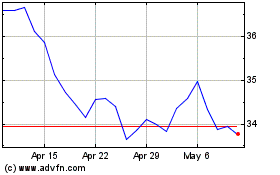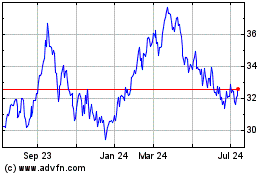(FROM THE WALL STREET JOURNAL 11/4/15)
By Yoko Kubota in Tokyo and Mike Spector in New York
Honda Motor Co. said it will no longer use Takata Corp. front
driver or passenger air-bag inflaters in new vehicles under
development, after alleging the supplier misrepresented and
manipulated test data.
The effective no-confidence vote from Honda, a major backer of
Takata, came the same day U.S. auto-safety regulators hit Takata
with a $70 million fine for lapses with rupture-prone air bags and
ordered the company eventually to stop using a controversial
propellant in the safety devices.
Takata Chief Executive Officer Shigehisa Takada told a news
conference in Tokyo Wednesday that the company will quit offering
inflaters with ammonium nitrate-based propellant world-wide in
coming years by gradually phasing it out. Instead, it will shift to
a different ingredient, guanidine nitrate, he said.
Honda -- which is Takata's largest customer and owns a small
stake in the company -- said it had reviewed millions of pages of
Takata internal documents from litigation over the safety problem
and alerted U.S. regulators to evidence it became aware of that
suggested the supplier "misrepresented and manipulated test data
for certain air-bag inflaters."
"Honda expects its suppliers to act with integrity at all times
and we are deeply troubled by this apparent behavior by one of our
suppliers," the Japanese auto maker said.
Hiroshi Shimizu, a Takata executive, denied Honda's allegation
that Takata has manipulated data. "We believe that did not happen,"
he told the Tokyo news conference.
Takata said in a statement that it regrets testing data issues
raised by U.S. regulators, and doesn't believe they are connected
to the current recalls.
Honda's decision adds to mounting woes at Takata. The Japanese
air-bag manufacturer agreed Tuesday to financial penalties for
failing to alert U.S. regulators in a timely manner to a defect in
some air-bag inflaters that can cause them to explode and spray
shrapnel in vehicle cabins, the National Highway Traffic Safety
Administration said. Takata also agreed to fire some employees that
regulators declined to name.
Takata had misled regulators by providing incomplete or
inaccurate information on the safety defect -- linked to eight
deaths and dozens of injuries -- dating back to at least 2009,
regulators said. That included providing misleading test reports
and failing to clarify inaccurate information in a January 2012
presentation to regulators, according to the settlement.
Takata will pay the $70 million in six installments over five
years under the settlement's terms. The company will be forced to
pay an additional $130 million if it violates terms of the
settlement or federal law. Regulators described the possible $200
million payout as a record penalty.
"We deeply regret the circumstances that led to this," said Mr.
Takada in an earlier statement, adding that the company is
"committed to being part of the solution." He pledged to comply
with terms of the settlement, which will "enable us to focus on
rebuilding the trust of auto makers, regulators and the driving
public."
Regulators assigned an independent monitor to audit the
company's safety practices for five years, including requirements
to eventually stop using phase-stabilized ammonium nitrate in
air-bag inflaters by the end of 2018.
U.S. officials have cited the chemical as being prone in some
instances to destabilizing and leading to explosions. Takata will
start reducing the use of ammonium nitrate on a variety of fronts
in driver-side and passenger-side air bags starting this year.
Still, Takata will be allowed to honor contracts entered before
Oct. 31 to keep selling air-bag inflaters using the chemical,
though regulators can later order those to be phased out too,
according to the settlement.
"This has been a mess," said U.S. Transportation Secretary
Anthony Foxx during a Tuesday news conference, describing a pattern
at Takata of misleading regulators and withholding information that
"caused a serious problem to become a massive crisis." The Wall
Street Journal reported details of the settlement earlier on
Tuesday.
The settlement with Takata caps a long-running back and forth
between the company and regulators over the problematic air bags
that are at the center of one of the largest and most complex
recalls in U.S. history. Regulators started investigating Takata in
June 2014 and later hit the company with smaller fines for an
alleged failure to cooperate with inquiries that were later
suspended. The agency also issued special orders compelling the
Japanese company to provide information to government
officials.
The air-bag recalls, now covering more than 19 million vehicles
in the U.S., could expand. Volkswagen AG and General Motors Co.
have reported recent ruptures in newer side air-bags not currently
covered as part of the far-reaching safety actions.
Older air bags employing ammonium nitrate as the propellant have
been linked to deaths and injuries around the world, with Takata
and regulators pointing to long-term exposure to humid climates as
a main contributor to ruptures. Regulators on Tuesday said millions
of additional vehicles are likely to be recalled, though they
conceded they couldn't yet offer a precise figure. Regulators said
Takata, after eight years, hasn't determined a root cause for the
air-bag ruptures.
Regulators also issued an unprecedented order to the company and
other manufacturers to speed recalls of the problematic air bags
amid concerns repairs are lagging. The agency prioritized repairs
of vehicles with older air bags with prolonged exposure to humid
climates, ordering car manufacturers to fix those vehicles by the
end of 2017.
As of late October, auto makers had addressed 22.5% of the more
than 19 million affected vehicles in the U.S. Takata still could
later face another hefty financial penalty depending on the outcome
of a U.S. Justice Department investigation. The company has said it
is cooperating with probes.
Five auto makers -- Honda, BMW AG, Fiat Chrysler Automobiles NV,
Ford Motor Co. and Mazda Motor Corp. -- account for 14 million of
the recalled vehicles and 18 million of the inflaters, regulators
said in October. Honda received a $70 million regulatory fine at
the end of last year for reporting lapses that included issues with
Takata air bags.
Subscribe to WSJ: http://online.wsj.com?mod=djnwires
(END) Dow Jones Newswires
November 04, 2015 02:48 ET (07:48 GMT)
Copyright (c) 2015 Dow Jones & Company, Inc.
Honda Motor (NYSE:HMC)
Historical Stock Chart
From Mar 2024 to Apr 2024

Honda Motor (NYSE:HMC)
Historical Stock Chart
From Apr 2023 to Apr 2024
